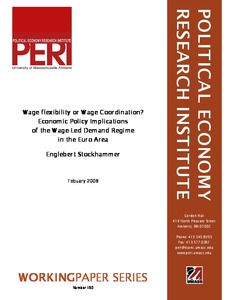Wage flexibility or wage coordination? Economic policy implications of the wage-led demand regime in the euro area

University of Massachusetts. Political Economy Research Institute
University of Massachusetts - Amherst
2008
13 p.
economic policy ; low wages ; wage policy
Working Paper Series
160
Wages and wage payment systems
English
Bibliogr.
"Wage shares have fallen substantially in Europe since the early 1980s. To some extent this is due to a macroeconomic policy package that encourages wage flexibility and wage competition. A system of wage coordination in the Euro area would facility a return to a productivity-oriented wage policy by reducing wage competition. In a recent study on the demand effects of changes in functional income distribution Stockhammer, Onaran und Ederer (2007) find that the Euro area is in a wage-led demand regime. According to their results a reduction of the wage share by 1%-point leads to a reduction of demand by around 0.2%-points of GDP. This finding has far reaching implications for economic policy. A stable wage share would help stabilize demand. The paper aims, first, at clarifying some conceptual issues in the design of a European system of productivity-oriented wage coordination and, second, it discusses the economic policy implications of wage coordination. The present policy package assigns wages the role of a shock absorber. However, as wage reductions do have negative demand effects in a wage-led demand regime, this policy has a deflationary bias. A system of wage coordination will thus have to be complemented by a more active nation fiscal policies and more fiscal redistribution within the EU. If so a regime of productivity oriented wage coordination will help to stabilize demand and it is consistent with price stability."
Digital
The ETUI is co-funded by the European Union. Views and opinions expressed are however those of the author(s) only and do not necessarily reflect those of the European Union or the ETUI.